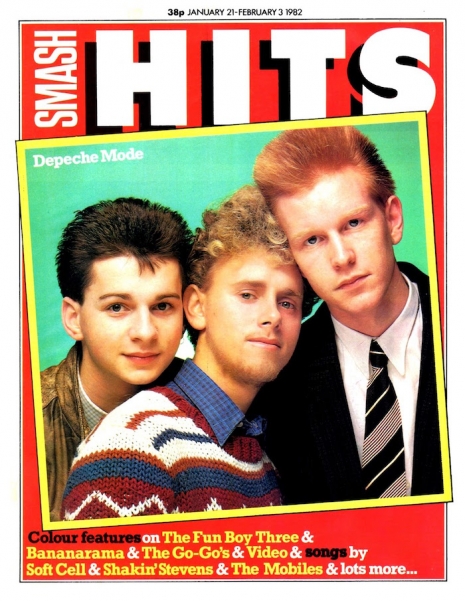
A few years ago there was a theory that Kraftwerk was the “most influential group in pop history.” The pitch goes something like this: The Beatles’ influence lasted about thirty-plus years while the electronica heralded by Kraftwerk continues to be of influence to this day. One of the chief proposers of this argument was Andy McCluskey from Orchestral Manoeuvres in the Dark who said:
When you listen to pop now, do you hear the Beatles, or do you hear electronic, synthetic, computer-based grooves?
It’s a moot point as nearly everything is electronic today. McCluskey clearly remembers the day he first heard the future of music—when Kraftwerk played the Liverpool Empire on September 11th, 1975. Though the venue was about half-full, this gig had far-reaching consequences. It was a starting pistol announcing the launch of bands like OMD, the Human League and Cabaret Voltaire who were to pioneer electronic music in Britain.
When OMD signed to Factory Records, McCluskey was utterly horrified when label supremo Tony Wilson said their music was the future of pop. OMD saw themselves (quite rightly in many respects) as creating serious artistic music. Though McCluskey vehemently disagreed at the time, Wilson has been proven right. Yet it wasn’t until Gary Numan, Visage, Soft Cell, and in particular Depeche Mode, could synthpop be said to have truly arrived.
Depeche Mode was originally a guitar band from Basildon, Essex called No Romance in China. It was formed by two schoolmates Vince Clarke and Andy Fletcher in 1977. The line-up changed as different members came and went until the band morphed into Composition of Sound with the arrival of Martin Gore on guitar.
When Clarke saw OMD in concert in 1980, he reinvented the group as wholly synthesizer-based band. With the addition of Dave Gahan on vocals, Depeche Mode were complete.
Clarke was the principal songwriter and main driving force behind the band. At the time he was working as a delivery driver for a lemonade company to pay for his synthesizer. They recorded a demo and hawked it around to different labels, yet, it wasn’t until Daniel Miller—head of the newly formed electronic record label Mute—saw Depeche Mode play a gig in London that he offered them a deal on the spot
Miller was one of the pioneers of electronic music. As The Normal he released two seminal singles “T.V.O.D.” and the J.G. Ballard-inspired “Warm Leatherette.” One of the reasons he offered Depeche Mode a contract—apart from the obvious synthpop association—was the fact people at the gig weren’t watching the band play, but dancing joyously to their songs.
Depeche Mode recorded a single “Dreaming of Me.” They followed this up with “New Life” and “Just Can’t get Enough”—which broke the band into the top twenty and mass coverage on BBC chart show Top of the Pops. These songs were synthpop delicacies of beautifully crafted perfection. Wilson’s prediction of the future sound of pop had arrived.
But all was not well with the band. In 1981 Clarke left Depeche Mode. There are no clear reasons why this happened other than Clarke’s own admission that he was a control freak who wanted to spend 24/7 in the studio. He went on to find his own success, first as Yazoo with Alison Moyet then as Erasure with Andy Bell.
Out of necessity, Martin Gore became Depeche Mode’s main songwriter. He steered the band in a darker, yet even more commercially successful way, eventually leading to Depeche Mode conquering America and becoming “the most popular electronic band the world has ever known.”
Watching this footage of Depeche Mode (post Clarke) perform live on Swedish TV show Måndagsbörsen in 1982, it’s hard to believe they were ever this young. They look like school kids performing at a grown-up party, y their sheer quality, professionalism and talent are undeniable. Depeche Mode played three snumbers “New Life,” “See You” and “Just Can’t get Enough.”
Previously on Dangerous Minds
Watch a baby-faced Depeche Mode ‘Live in Concert’ appearance, 1981